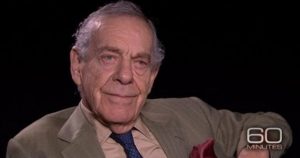Stella Case No. 025, Originally Published: 11 December 2002
The state of Mississippi is becoming known as a place where sympathetic juries provide huge payouts to plaintiffs (including Case No. 001). In a recent broadcast, CBS TV’s 60 Minutes aired a segment on lawsuits in Mississippi’s Jefferson County, and quoted a local man who said jurors give out money “because they felt as if they were going to get a cut off of it.”
Morley Safer, the 60 Minutes correspondent, wanted to be sure he heard that right: “The jurors benefit? Is that what you’re saying?” he asked.

“They benefit after court, and everything is over with. Yes, sir,” he replied, adding it was “under the table.”
The local man did not identify any specific juror, or any particular case, but two of the thousands and thousands of people who have sat on Jefferson County juries objected to the characterization. Anthony Berry, who was on a jury that awarded $150 million in an asbestos case, and Johnny Anderson, who was on a panel which awarded $150 million in a diet drug case, have filed suit — in Jefferson County, of course — against CBS and a newspaper publisher who made similar comments on the broadcast. They say the comments “were libelous, slanderous and defamatory” against Jefferson County juries as a whole and are seeking $597 million in “actual” damages and $5.9 billion in punitive damages.
“This suit proves the truthfulness of what I said on TV,” said publisher Wyatt Emmerich. “If you can expand slander to include an entire class, there is no free speech,” he said. “You can’t say anything critical.”
And that’s exactly what many lawsuits are designed to do: strike fear into commentators so they will stop public discussion of problems so the people causing the problems in the first place can continue on, without anyone looking over their shoulders.
Sources
- “TV Show on Mississippi Justice Stirs Suit”, Jackson Clarion-Ledger, 10 December 2002
Case Status
The case was filed by “Anthony BERRY, Almeta Dorsey, Johnny Anderson, Elroy Thomas, Minnie Woods, Lee Guice, Don Donaldson, Thelma Sanders, and John Does 1-21 Plaintiffs,” against “Morley SAFER; Viacom Inc.; 3M Company; CBS Broadcasting, Inc.; Don Hewitt; Media General Operations, Inc., d/b/a WJTV; Beau Strittman; Wyatt Emmerich; Deidre Naphin; Jennifer Breheny; and Jane Does 1-1000 Defendants.”
It’s pretty common to put in “Does” (as in John or Jane) as defendants if whoever is filing the suit doesn’t yet know the identity of all the defendants at filing time; it’s a placeholder of sorts. A thousand of them seems a bit excessive. Adding “Does” to the list of plaintiffs seems even more so.
I presume 3M was the big pockets sponsor of that particular episode. Not surprisingly, the case was dismissed with prejudice. I found one vague reference that indicates that decision was appealed, and dismissed again in 2005.
My 2020 Thoughts on the Case
One can’t prove libel when the supposed target can’t be readily identified. Not to mention that a news organization must have leeway in covering possibly explosive topics of clear public interest, such as allegations that jurors are being bought off. This was an obviously correct decision based on the Constitutional concepts of freedom of speech and freedom of the press.
Safer was the longest-serving 60 Minutes correspondent: 46 years — and that was after a 15 year career as a field reporter, including war correspondent from at least nine wars. He announced his retirement in 2016, and died just eight days later, at 84.
Letters
There was a reader objection to the case of Jack Ass v. Jackass:
Michelle in Illinois: “This story and your comments really bothered me. If the positions were reversed and this man started using “Jack Ass” *after* MTV had started their show or put out the movie, you KNOW MTV’s lawyers would be on him like white on rice for copyright infringement. I hardly think it seems unfair for the same standard or rules to be held to MTV or any other big corporation.”
While corporations often do try to take common words out of circulation by claiming ownership (McDonald’s, for instance, is known to fight viciously against companies with “Mc” or “Mac” in their — or their or products’ — names), that didn’t happen here. Rather, a guy changed his name for (non-profit) business reasons, didn’t register it as a trademark, and then sued someone who did — yet even they, as I demonstrated, don’t have exclusive use of the word. Anyone who changes his name to “Jack Ass” and claims that anything someone else does is “disparaging” to him is rather an …well… ass.
Gerry in Washington: “One of the letters by a lawyer stated ‘[people hate them] until you need one’. Well as far as I’m concerned, most people don’t NEED a lawyer. What they need is to return to the basic ideals of fair play, standing on your own two feet, taking responsibility for your actions, and the REAL difference between right and wrong. Frivolous law suits are a mockery of our justice system.”
I understand what you’re saying, Gerry, but I do think people would “need” lawyers even if everyone knew right and wrong. There are legitimate differences of opinion.
- - -
Email Subscriptions
No new cases are being published, so please don’t try to submit cases.
My Flagship Email Publication This is True continues to come out with new stories every week. It’s “Thought-Provoking Entertainment” like Stella, but uses weird-but-true news items as its vehicle for social commentary. It is the oldest entertainment newsletter online — weekly since 1994. Click here for a This is True subscribe form.
